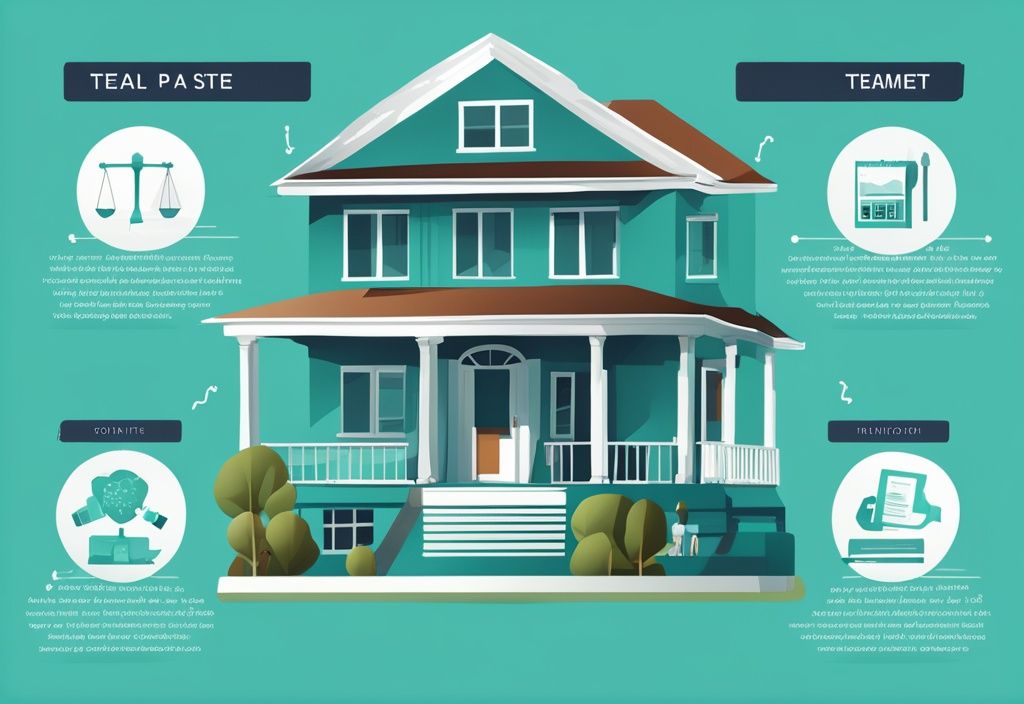
Have you ever found yourself sprawled across a sea of alphabet soup while wading through real estate terminology? If so, you’re not alone. With numerous acronyms like “PA” floating around, it’s easy to feel lost. As a seasoned real estate expert, I’m here to guide you.
In this enriching dive, we’ll tackle the tides of the “PA” acronym, unravel its meanings, and see how it shapes your real estate landscape. We’ll delve into the possibilities that this little-known entity offers, from liability protection to tax benefits.
So, why not ease your navigation through real estate’s complex waters? Stay with me as we explore the role of PA in shaping transactions and the whole ballet of business operations in the real estate world. Buckle in; this voyage promises to be as enlightening as it is exciting.
Decoding ‘PA’ in Real Estate
PA: Definition and Legal Meaning
In the world of real estate, “PA” stands for “Professional Association.” You might wonder, why would a real estate agent or broker choose this designation? Well, forming a PA allows them to operate with the benefits of a corporate structure rather than as sole proprietors. This setup provides valuable liability protection, similar to what a corporation offers, ensuring personal assets are shielded from business liabilities.
By setting up a PA, real estate professionals can clearly separate their personal finances from their business finances. This creates a clean legal boundary, which can make financial management smoother and enhance professional credibility. Of course, forming a PA isn’t just a matter of filling out a form; it involves adhering to specific state regulations and filing requirements, which can vary. But the operational and financial advantages, such as easier financial tracking and improved professional stature, often make it well worth the effort.
Common Misconceptions: PA vs Purchase Agreement
One common point of confusion in real estate is the dual meaning of “PA.” Primarily, it stands for “Professional Association,” but you’ll also hear it used to refer to a “Purchase Agreement.” Now, what’s a Purchase Agreement? It’s a critical document in real estate transactions, acting as a legal contract between a buyer and a seller. This document outlines everything from the purchase price and closing date to contingencies and items included in the sale.
Such dual usage of “PA” can create misunderstandings, especially when discussing real estate terms in varying contexts. While a Purchase Agreement becomes legally binding once it’s signed by both parties, a Professional Association is a separate legal business entity. Each offers distinct benefits and protections: the PA provides operational safeguards and credibility, while the Purchase Agreement ensures clarity and legality in a property transaction.
Understanding the context in which “PA” is used is essential for clear communication in the real estate industry.
It’s crucial to discern whether the conversation revolves around a legal business structure or a contractual agreement related to property transactions. This awareness helps avoid mix-ups and ensures everyone is on the same page.
Merits of Establishing a PA in Real Estate
Protection from Liability: One of the Key Advantages
Establishing a Professional Association (PA) in real estate comes with significant benefits, primarily offering strong liability protection. By doing so, you can effectively shield your personal assets—such as your home, car, and savings—from business-related risks.
This legal structure ensures that if your PA encounters legal trouble, your personal assets stay protected. It’s like having a safety net for your belongings. However, remember that the exact level of protection can vary depending on the state you operate in.
Consulting a business attorney to grasp your specific protections is a smart move. Besides asset protection, incorporating as a PA can boost your business credibility. It helps in providing professional safeguards and enhances your legal robustness in the competitive business landscape.
Promising Tax Incentives and Deductions
Running a PA offers multiple tax advantages, allowing real estate agents to be taxed as a corporation, which can significantly lower their tax bill. One of the main perks is the ability to deduct various business expenses, thus reducing your overall taxable income.
Thinking about tax efficiencies? Opting to be treated as an S Corporation can be a game-changer. This status permits agents to save on self-employment taxes by minimizing the Social Security and Medicare (FICA) taxes they owe.
But remember, achieving this status isn’t automatic – it requires adhering to IRS guidelines, including filing Form 2553 on time. Understanding and following these requirements is key to fully benefitting from the tax advantages a PA offers.

PA Real Estate: Impact on Transactions and Commissions
When you dive into the nitty-gritty of real estate, you’ll often come across the term PA. But what does PA stand for in real estate? It stands for Professional Association, a structure that can significantly influence transactions and commissions. Let’s break down how PAs impact the daily workings of real estate agents.
Reporting Income & IRS Compliance: How PAs Contribute?
Leveraging a PA structure allows real estate agents to report income in a way that maximizes tax benefits. By operating under a Professional Association (PA), agents can effectively separate their business income from personal income. This separation isn’t just a matter of tidiness; it enhances financial organization and boosts transparency for tax purposes.
Why is this important? Well, it can lower the risk of IRS audits compared to sole proprietorships. The clearly defined boundaries between personal and business finances reduce the likelihood of discrepancies.
Moreover, compliance with IRS regulations is crucial when using PAs. For instance, if you opt for S Corporation status, you need to file Form 2553 within 60 days. This step changes the tax treatment dramatically, providing potential benefits like avoiding double taxation and reducing self-employment taxes. Following these guidelines is essential to fully capitalize on what a PA offers.
The Effect on Commission Checks and Commercial Accounts
To tap into the full benefits of a PA, it’s crucial that your commission checks are made out to the PA, not to you individually. Informing your broker about this new payment structure is a must. This practice aligns with legal requirements and simplifies financial management, making everything more transparent.
Having a separate business account for the PA is vital too. This dedicated account helps manage and oversee transactions specific to the business. You gain improved financial oversight, making it easier to manage commercial accounts. By establishing this, you’re ensuring that all business-related income and expenses are accurately reflected and managed.
This setup isn’t just about numbers on a page; it fortifies the PA’s legal standing and operational efficiency. The PA structure impacts commission processing, offering a more streamlined approach. You’ll find better control over your finances, ensuring everything is clear and organized.
Steps to Form a PA for Real Estate Professionals
If you’re thinking about forming a Professional Association (PA) for your real estate business, you’re in the right place. This process can seem daunting, but breaking it down into manageable steps simplifies everything.
Necessities: Legal and Administrative
Starting with the essentials, obtaining a tax ID number is your first task. It’s crucial for all financial interactions.
Think of it as your PA’s social security number—a unique identifier in all its transactions.
Approval from your state licensing board is next. Each state has its own set of regulations, and this step ensures your PA is compliant right from the start. You’ll file your articles of association with the Secretary of State, which officially establishes your PA as a legal entity.

One critical decision you’ll make is electing S Corporation status. By filing Form 2553 with the IRS, you can gain some significant tax advantages. It might sound complex, but trust me, the potential tax savings are worth it.
Don’t forget to open a separate business bank account. If you’re also curious about what EMV means in real estate, be sure to check out our detailed guide. This keeps your finances transparent and separates personal transactions from business ones.
Given how state laws can differ, it’s wise to seek professional guidance here. A legal expert can navigate these waters smoothly, ensuring you don’t miss any crucial steps.
Choosing S Corporation Status: Should you Consider it?
Choosing S Corporation status can be a game-changer for real estate professionals. Why? Because it helps you sidestep double taxation and reduces self-employment taxes.
This tax structure means your PA is only taxed once, which is a direct benefit to both the entity and its shareholders. But it’s not a decision to take lightly. Weighing the potential tax savings against other factors is crucial.
Here’s where consulting a tax professional comes into play. They can provide the tailored advice you need to make an informed decision. Ultimately, this choice should align with your long-term business goals and financial health.
Professional Guidance: Why you Need it?
Forming a PA in real estate isn’t just about filling out forms. It’s about complying with a complex web of state-specific regulations. That’s why professional guidance is invaluable.
Consulting with a business attorney ensures all legal requirements are met, offering you the comprehensive protection you need. A legal expert can provide tailored advice and ensure every document is correctly filed. This way, you maximize all the benefits of your PA structure.
In essence, professional guidance saves you time, stress, and helps you navigate any potential legal pitfalls. It’s an investment in the smooth operation and future success of your PA.
Understanding PA in Real Estate: Frequently Asked Questions
PA vs Sole Proprietorship: What’s the Difference in Real Estate?
A PA, or Professional Association, is a legally recognized entity that offers liability protection, unlike a sole proprietorship. By operating as a PA, your personal and business finances are separated. This structure provides tax advantages and professional credibility, features that sole proprietorships lack. Ever wondered how you can leverage this in your practice? It’s simpler than you might think, and the benefits could outweigh the initial setup efforts.
Decoding Liability Cover offered by a PA
A PA offers limited liability protection to its shareholders, which helps safeguard personal assets against business liabilities. However, liability protection can vary by state. Isn’t it reassuring to know you’re shielded from business debts? Just make sure to consult with a business attorney to understand the specific protections available in your jurisdiction. It’s worth the peace of mind.

Understanding the Tax Benefits of Launching a PA
Forming a PA allows real estate agents to be taxed as S corporations, thereby avoiding double taxation and reducing self-employment taxes. Think about the savings! Tax benefits include deductions for business expenses and lower self-employment tax rates. But remember, compliance with IRS and state regulations is crucial to maximizing these benefits. Don’t miss out!
The Formation of a PA: A DIY Guide for Real Estate Professionals
To create a PA, you must:
- Obtain a tax ID number
- Secure approval from the licensing board
- File articles of association with the Secretary of State
Additionally, you should elect S corporation status by filing Form 2553 with the IRS and open a separate business account to streamline financial management. It might seem like a lot, but breaking it down step-by-step makes it more manageable. And the end result? A more secure, credible business setup.
PA or LLC: What Should Real Estate Agents Choose & Why?
Both PAs and LLCs offer liability protection but differ in formation requirements and tax implications. Licensed professionals may be required to form a PA or PLLC instead of a general LLC. The choice between PA and LLC depends on state regulations and your specific business needs. Which option fits your situation best? Consider your long-term goals and consult with a legal expert to make an informed decision. Each structure has its merits, but aligning it with your business strategy is key.
Wrapping Up: A Concise Understanding of PA in Real Estate
In the realm of real estate, PA stands for “Professional Association”. This legal designation is specifically utilized by licensed real estate agents and brokers. Opting for the PA structure allows real estate professionals to elevate their business operations through advantages like liability protection and potential tax benefits.
Real estate professionals often consider various factors when optimizing their business, such as understanding what TLC in real estate entails. So, why choose a PA? One of the primary perks is protection from liability. This structure separates your personal and business finances, reducing the risk to personal assets such as your home and bank accounts if legal issues arise. The liability protection offered by a PA is similar to that of a corporation, allowing you to focus on your professional endeavors with peace of mind.
Then there are the valuable tax incentives. Forming a PA can allow for taxation as an S Corporation, leading to significant tax savings for many agents. These savings often come through deductions for business expenses and lowered self-employment taxes. To unlock these benefits, however, you’ll need to meticulously comply with IRS regulations, including the timely filing of Form 2553 to elect S Corporation status.
Establishing a PA involves several legal and administrative steps. Typically, this process includes obtaining a tax ID number, gaining approval from your licensing board, and filing articles of association with the Secretary of State. Given the complexity and state-specific nature of these requirements, consulting a business attorney is highly recommended.
Professional guidance can ensure full compliance and help maximize your PA’s advantages.
When considering a PA, think about the extent of liability protection needed, potential tax savings, and the overall impact on business operations and transactions. A well-structured PA can enhance financial management through separate business accounts and streamline handling commissions and commercial transactions.
Before diving into more complex topics, such as what is adverse possession in real estate, it’s crucial to understand what PA stands for in real estate and the myriad benefits it offers.
The PA designation is more than just a legal formality—it’s a strategic move towards enhanced credibility, operational efficiency, and financial security. By incorporating this structure, you’re not just protecting your assets; you’re also positioning your business for long-term success.






